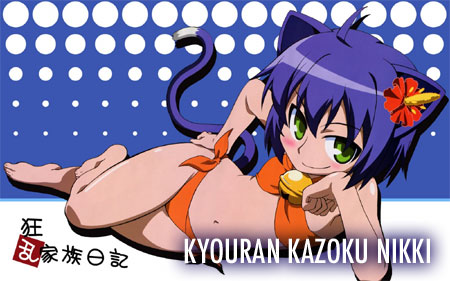Ask John: What’s John’s Opinion of Kyouran Kazoku Nikki?

Question:
What’s your opinion of Kyouran Kazoku Nikki so far? Also, how likely is a U.S. license for the show?
Answer:
As a long time devotee of cat-girls, it’s no surprise to me that I’m a fan of the Kyouran Kazoku Nikki television anime. The point that does surprise me is the show’s uniqueness and ability to consistently entertain.
I’m not familiar with Akira & x6suke’s original novels, so I don’t know how much the anime adapts from the original novels and how much of the show’s content comes from the minds of its creators, but comparisons aren’t necessary. Ultimately the anime must be considered on its own integrity. True to its name, the show is maniac, frenzied, funny, satirical, and, I suspect, a bit under appreciated by American anime fans. While Kyouran Kazoku Nikki does reference numerous genre conventions – frequently for the purpose of parody – the show is, in fact, quite unique. There are other parody comedies, and other shows about unusual families, but there hasn’t been a comic anime about a family this exceptionally unusual since 1999’s Tenshi ni Narumon, another show that went unappreciated in America. So maybe this is a consistent trend in American viewer tastes.
One frequently overlooked characteristic of good anime that impresses me is the use of multiple eye-catch and/or credits sequences. I take it to be a revealing sign that the animation staff cares a lot about a show when the staff devotes extra effort to create multiple ending animation sequences or eye-catch frames. Kyouran Kazoku Nikki has both unique episode eye-catch illustrations and revolving ending animation sequences.
The Kyouran Kazoku Nikki anime perpetuates the frenetic spirit of unpredictable comedy anime including Ranma 1/2 and Excel Saga. Its irreverent spirit, non-sequiteur humor, and tendency for randomness likewise evoke the spirit of 90s comedy anime, which is enjoyable for fans of that variety of anime, but may not be as accessible to viewers used to contemporary anime styles. The show also deserves tremendous credit for its ability to reference and parody countless genre conventions without seeming obviously sycophantic.
Episode 2 pays homage to the tokusatsu tradition while skewering the anime trope of schoolyard bullying. Episodes 4-6 deconstruct the “mad professor” stereotype. Episode 7 is the series’ first ridiculously bizarre gag episode. Episode 10 is another. Episode 11 parodies the “first love” romance genre by first introducing a romance between an android and a human girl, then by revealing an even more improbable obstacle to the relationship. Episode 12 is especially noteworthy because it proves that the show’s humorous tone is strong enough to support even episodes that practically exclude the entire primary cast. Episode 13 parodies the “girls school” anime genre while mixing in a lot of bizzare gag humor. Episode 15 is an exceptionally amusing and incisive magical girl parody on multiple levels. The episode pokes fun at the typical characteristics of magical girl anime, including pet characters, young girls, and nonsensical magical chants. The humor is compounded by the fact that Kyouka goes to, and accepts help from her nemesis. Episodes 16 & 17 references Tezuka’s Jungle Emperor while episode 18 pays homage to the classic sci-fi film Fantastic Voyage. It’s a credit to the show that all of these homages and parodies exist within the series, yet they all feel natural and organic to the construction of the show compared to, for example, Excel Saga, which made its parodies much more obvious.
Predicting a future American release for this show is especially difficult. The visual impact of the cat-girl Kyouka, in conjunction with the anime’s vibrant color scheme and energetic tone may be easy to market and may attract the attention of American consumers. However, the fact that the show is quite different from other anime and not a massive cult hit may limit its domestic acquisition potential. With domestic sales in a slump, domestic distributors can’t afford to take risks on exceptional shows with uncertain American commercial potential. When investing in a new acquisition, it may be safer to invest in a more conventional series similar to those that have already proven themselves successful in America. Kyouran Kazoku Nikki won’t be considered one of 2008’s best anime, but it may be among 2008’s most entertaining anime productions. I do think that the show can and should be considered a potential American release, but it’s not a show with assured, practically inevitable American distribution in its future.
Add a Comment
You must be logged in to post a comment.

